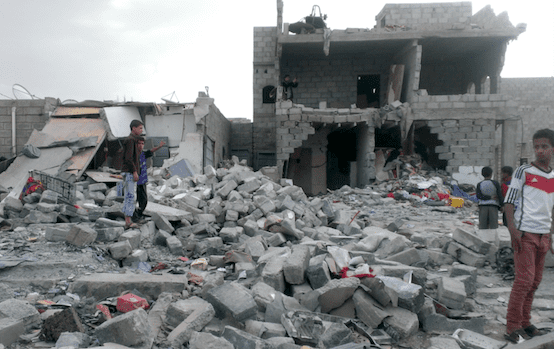The WSJ’s Despicable Defense of the War on Yemen

The Wall Street Journal echoes Pompeo’s obnoxious Yemen lies in their editorial on the antiwar resolution that the Senate passed last week:
The Saudis aren’t in danger of an Iranian invasion, but don’t underestimate the signal that abandoning our ally would send across the Middle East. It will be seen by Iran and Russia as an invitation to more trouble-making, and another signal to allies that the U.S. can’t be trusted. More war is the likeliest result.
There is no foreign war so despicable and unjust that The Wall Street Journal won’t defend it to the end. It is telling that the WSJ editors don’t talk about the war on Yemen until Congress moves to try to withdraw the U.S. from it. The massive humanitarian crisis that threatens the lives of as many as 15 million Yemenis doesn’t concern them (and it never comes up in this editorial), because if they mentioned it that would remind everyone that the Saudi coalition bears the greatest responsibility for causing mass starvation and creating the conditions for the world’s worst modern cholera outbreak. The U.S. has not only been enabling Saudi war crimes in its bombing campaign, but our government has also been helping to create the world’s worst humanitarian crisis through our unstinting support for the war. The editorial omits all of this because including it would show how breathtakingly cynical and horrible the pro-war argument is. War supporters never acknowledge the consequences of the destructive policies they defend because they know it would discredit them, and so they try to change the subject to anything else. In this case, war supporters have been desperate to make the Yemen debate about Iran because they cannot honestly talk about the costs of the conflict or the U.S. role in it.
Saudi Arabia is not an ally of the United States, and our government isn’t obliged to support them in a military intervention they chose to begin along with the United Arab Emirates without consulting Washington. The U.S. certainly isn’t obliged to indulge them in their failed war of choice almost four years later. The war has become a drain on Saudi and Emirati resources, and it has exposed them as weak, cruel, and incompetent as they have devastated Yemen’s infrastructure, starved its people, and failed achieved any of their stated goals. No one should care about doing these despotic governments any favors, but forcing them to end their war would be doing them a favor all the same. If the U.S. were perceived as abandoning the Saudis by halting support for their war, that would be guaranteed to improve our country’s reputation around the world rather than harm it. The U.S.-Saudi relationship is a liability and an embarrassment for our country, and the sooner we are rid of it in its current form the better it will be for us and the region.
Supporters of the war on Yemen have no rational argument for continued U.S. involvement, and so they are reduced to changing the subject from the war criminal states that the U.S. aids and abets to the Iranian government that has almost nothing to do with the conflict. Ending U.S. support for the war would be a “gift” to Iran, the WSJ editors tell us, as if four years of keeping the Saudis and Emiratis bogged down in a war they cannot win has done anything to harm Iran or curtail its influence in the region. The lie at the heart of the war on Yemen is that it has something to do with opposing so-called Iranian “expansionism,” but it is the war itself that has done more for Iranian influence in Yemen than anything else. The longer that the U.S. enables the Saudi coalition to continue its senseless and indefensible campaign, the better it is for the Saudis’ and Emiratis’ rivals. Iran hawks are always wrong about what benefits Iran’s government and what harms it, and this is no exception.
The editorial’s comparison between last week’s vote and Congressional opposition to continued involvement in the Vietnam War is unintentionally revealing and damning for their side. Just like supporters of the Vietnam War, supporters of the war on Yemen are defending a war that can’t be won in a place where the U.S. should never have been involved. In this case, war supporters are squarely on the side of the aggressors, and in their continued backing for this disgraceful policy they show their utter contempt for the lives of the people of Yemen.
Comments